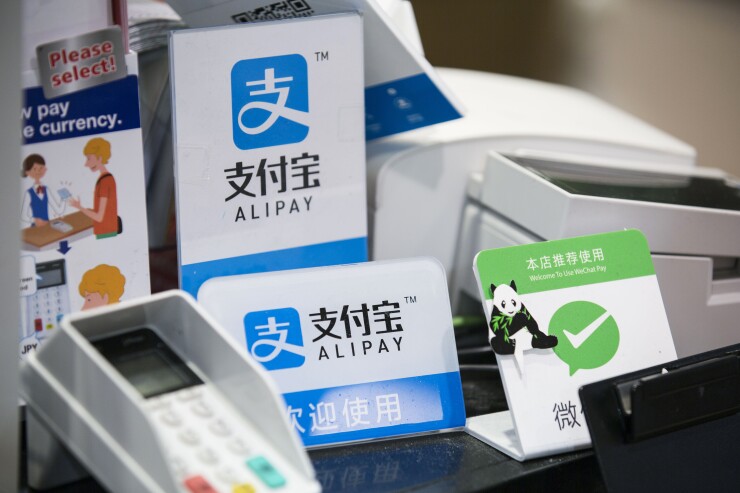The information you need to start your day, from PaymentsSource and around the web:
Picture of health?
The Chinese government is already using
China's state media is called the feature the Alipay Health Code. It assigns people a green, yellow or red rating accessible via a QR code on the Alipay app at subways and office buildings. People with a green status can be out in public, yellow status results in a request to stay at home for seven days and red status results in a two-week quarantine, reports
Ant and the Chinese government did not provide details on how the app works, though it reportedly also shares information tied to the health code and transactions with law enforcement, according to
Faster faster delivery
Shortly after
The move improves the ordering window for fast delivery, according to
Overnight orders can be received by 1 p.m. the following day, and Amazon will make about 100,000 items available for this service.

Tough year
London-based payments company Finablr said its earnings will suffer from both the coronavirus and the recent cyber attack that hurt its Travelex currency exchange business.
The company expects the headwinds to knock about $35 million from its first quarter earnings. It's a reversal for the company, which had previously said the attack would not hurt its results, reports the
The ransomware attack will also prevent Finablr from publishing full-year 2019 results until mid-April, because it was unable to access reporting tools for part of January.
Fintech breach
Loqbox, a U.K. technology company that helps consumers improve their credit rating, has suffered an external attack that has exposed parts of bank account numbers used to make payments.
Additionally, it's possible credit card numbers and expiration dates were exposed, reports
The company told the U.K. paper it was a "sophisticated" attack and it's working with law enforcement, but it has not yet determined how the incident happened.
From the Web
REUTERS | Wed March 4, 2020
Klarna, Europe’s most valuable fintech company, said on Wednesday that China’s Ant Financial Services Group had taken a small stake in it as the two strengthen their online shopping partnership. The Swedish ‘buy now, pay later’ app is already embedded in AliExpress, the international shopping platform run by e-commerce giant Alibaba Group, an affiliate of Ant Financial.
TECH REPUBLIC | Tue March 3, 2020
Cybercriminals are now partnering with drug cartels across Latin America to attack financial institutions and governments, leveraging a wide variety of scams and malware to make millions, according to a new report from cybersecurity firm IntSights. Attackers were able to convince users to enter credentials and personal information into these fake bank websites, which were then used on the real bank website to steal money from accounts.
TECHCRUNCH | Tue March 3, 2020
Sao Paulo-based fintech company Nubank, known for its fully-mobile digital bank and credit card, has raised $820 million across seven rounds of investment and has amassed nearly 22 million customers in Brazil alone. Now, the Nu credit card is available to all Mexicans over 18 years of age – and has already grown a waiting list of 30,000 Mexican customers.
More from PaymentsSource
Operational efficiency has long been the key to selling AP automation, but a growing payment fraud problem and new risk exposures are giving businesses new reasons to digitize payments.
For the past decade, the drive for modern restaurant point-of-sale terminals and software has turned into a highly competitive race seeking new looks and ideas.
Something as simple as the sale of cheese can show how fear instantly affects the economy, disrupting trade and the transaction fees that processors rely on.
Apart from cash vouchers, local credit card schemes are a commonly used payment method in Latin American e-commerce, making up 62% of online payments.





